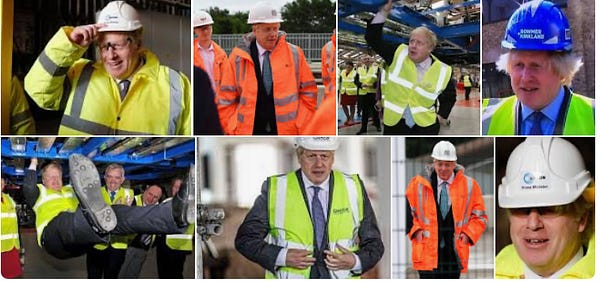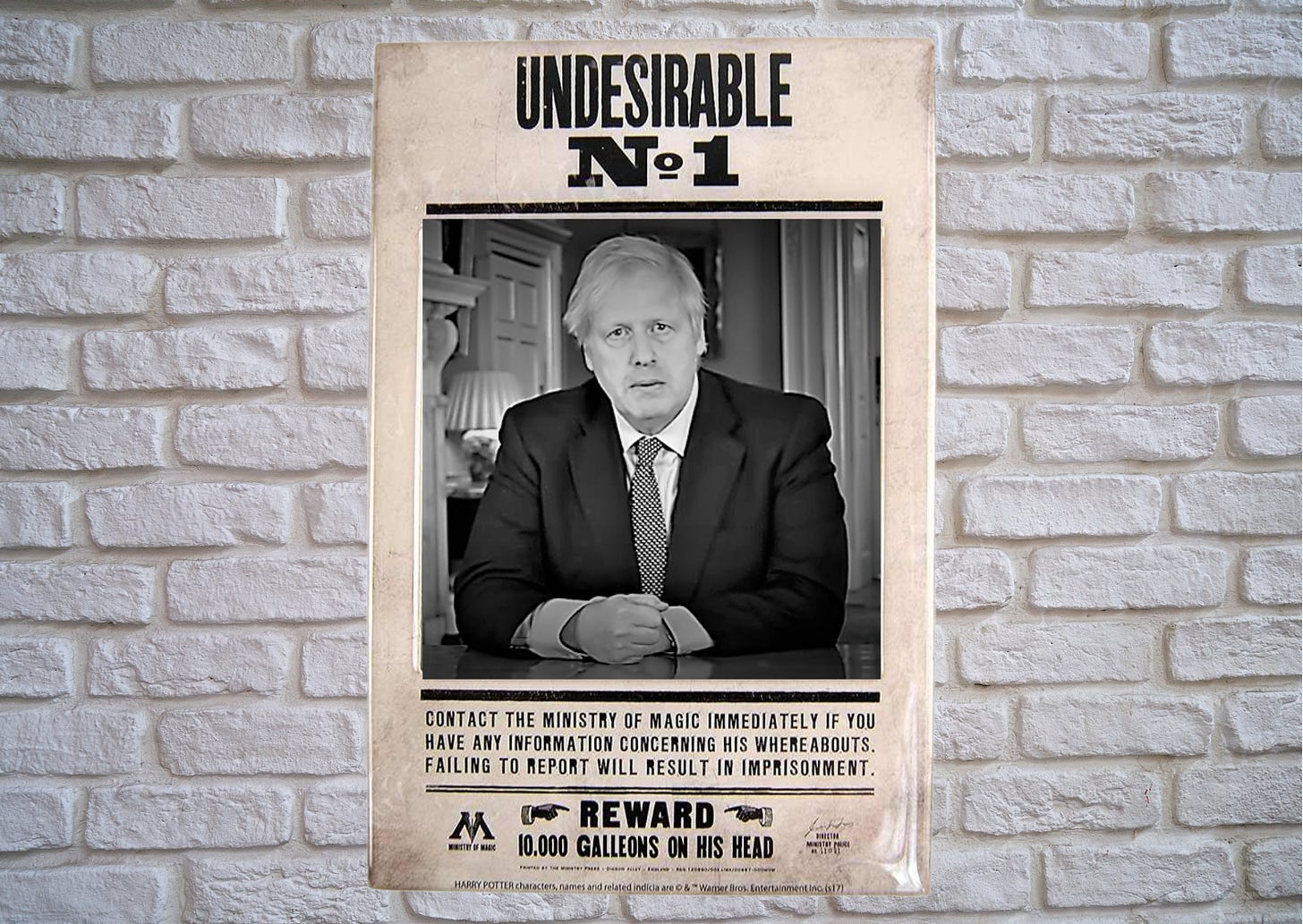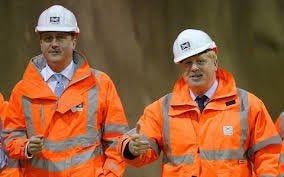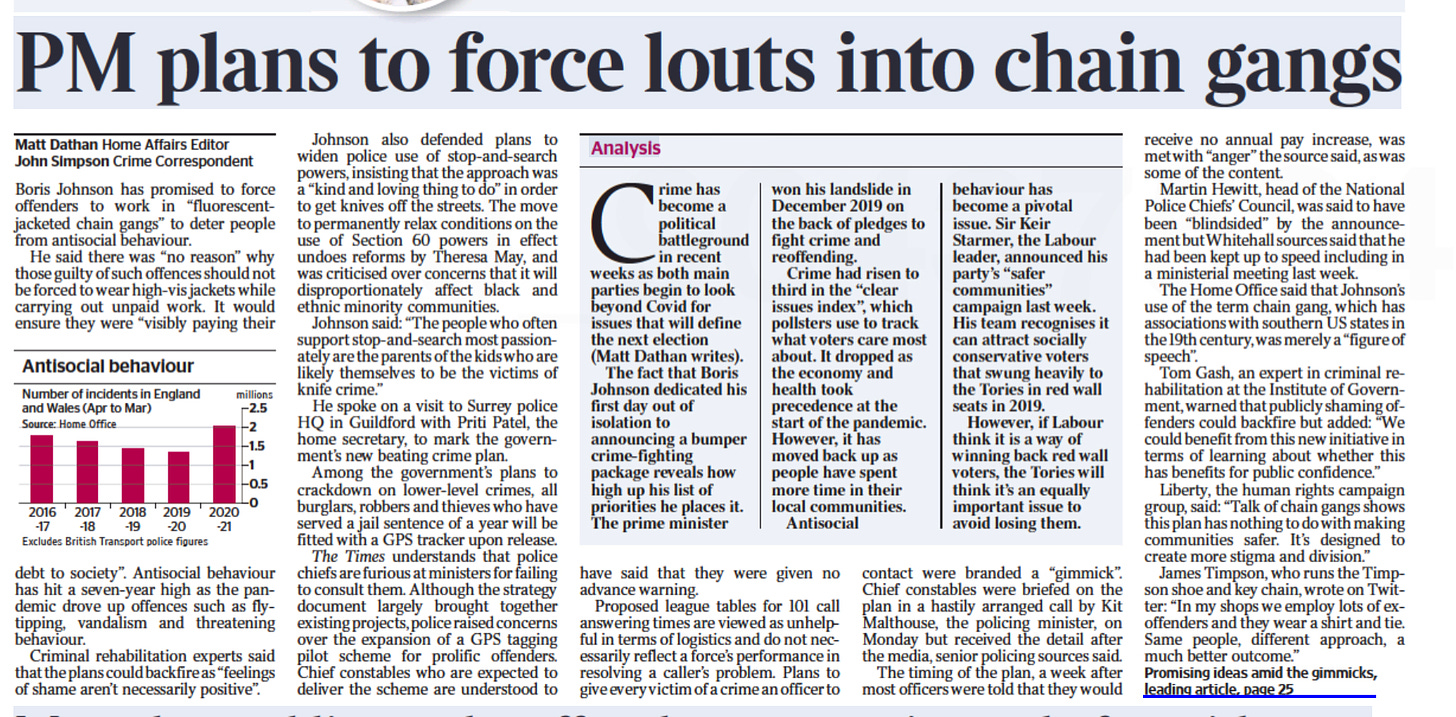Bullingdon Bail: How the newspapers ignore Boris Johnson’s criminal hypocrisy.
The Prime Minister has often been lucky not to be the prime suspect.
This edition of the newsletter is not sponsored by Sky Broadband, whose general fecklessness has led to me completing today’s instalment from the café in the local branch of Waterstones. If you encounter spelling mistakes or suddenly eruptions of rage uncharacteristic for this famously even-tempered publication that is my excuse…
Standing outside a police station — unable to work out how to use an umbrella, a living metaphor — Boris Johnson launched his crushingly literal ‘Beating Crime Plan’ yesterday. He claimed that he wants:
… to see those guilty of anti-social behaviour properly paying their debt to society… if you’re guilty of anti-social behaviour… I don’t see any reason why you shouldn’t be out there in one of those fluorescent-jacked chain gangs visibly paying your bet to society.
That’s the same Boris Johnson who, as a student at Oxford, was a member of the Bullingdon Club. The notorious dining/drinking club smashed up restaurants with disgusting regularity, usually paying their way out of trouble by throwing piles of money at the owners. However, on one occasion during the Bullingdon’s Boris-era a pot plant was thrown through a restaurant window and members of the club, in their ludicrous attire, spent the night in police cells.
Young Boris claimed to several people that he was one of the men who were locked up, according to Sonia Purnell’s biography Just Boris: A Tale of Blond Ambition, though ‘friends’ of the Prime Minister have since claimed he was simply practising one of his favourite hobbies: Lying.
In The Oxford Myth (1988), a book of essays edited by the Prime Minister’s sister, Rachel Johnson, Sebastian Shakespeare, now a Daily Mail journalist, wrote about the pot plant incident. He claimed that Cameron and Johnson made their getaway while other members were tracked down by sniffer dogs and spent the night in the cells. Shakespeare told the Daily Beast that Ralph Perry-Robinson, a Bullingdon member, was his source for the tale and that:
[He] got into terrible trouble with his contemporaries for blabbing to me in that book. It’s not the done thing. Whenever I remind Mayor Boris about his time in the book, he whispers ‘Omertà, Omertà’ under his breath.”
The club also hired sex workers to attend its events in the mid-80s, as confirmed by Perry-Robinson, also to The Daily Beast:
We always hired whores… prostitutes were paid extra by members who wanted to use them.
Purnell passes on an anecdote in which Johnson took charge of destroying a new Bullingdon member’s room with twelve other privileged vandals as part of an initiation ritual. Dressed in tailcoats, they broke furniture, destroyed books, and smashed up a hi-fi in Radek Sikorski’s room. Purnell writes that Johnson then shook Sikorski’s hand and said, “Congratulations, you’ve been elected.” Again, the Prime Minister’s ‘friends’ deny this happened as reported.
What is undeniable however is that the Prime Minister has talked about taking cocaine, just like his dear frenemy Michael Gove. In a 2007 GQ interview with fellow monstrous ego Piers Morgan, Johnson tried a variant of Bill Clinton’s “I didn’t inhale” dodge:
You once alluded to the fact that you tried cocaine but sneezed on it.
Yes. I tried it at university and I remember it vividly. And it achieved no pharmacological, psychotropical or any other effect on me whatsoever.
Some of it did creep in to your big hooter, then, despite the sneeze?
It must have done, yes, but it didn’t do much for me, I can tell you.
Morgan, who only likes to ask tough questions when his interviewee isn’t someone he wants to suck up to, did not press the issue further.
As is common with Boris Johnson, he was reusing the same line he’d tried on… err… lines two years earlier during an appearance on Have I Got News For You. On that occasion he said:
I think I was once given cocaine, but I sneezed so it did not go up my nose. In fact, I may have been doing icing sugar.
It was a lie wrapped in a joke and Johnson admitted as much in an interview with Janet Street-Porter for Marie Claire in 2008, during his first successful campaign to become London Mayor. At that point, he was trying to present himself as serious and tough so his answer attempted to reflect that:
… that was when I was 19. It all goes to show that sometimes it’s better not to say anything. I thoroughly disagree with drugs.
I don’t want my kids having drugs.
He went on to talk about smoking cannabis at university:
That’s true [I did] but the stuff you and I may have smoked is not the same as what the kids are having now. I think stuff and this stuff is very, very dangerous.
Following the Marie Claire interview Johnson said:
To say that I have taken cocaine is simply untrue. As I have said many times, I was once at university offered a white substance, none of which went up my nose and I have no idea whether it was cocaine or not.
I suspect that if Johnson were not a white, ex-Etonian, Oxford graduate, that kind of defence would get very short shrift in the court of public opinion let alone at Crown Court.
It’s also curious that Johnson is so coy about drugs at Oxford, given that Allegra Mostyn-Owen, who was his fiancée at the time of her contribution1, wrote a chapter in The Oxford Myth, discussing the presence of hard drugs at parties at that time:
Back in 1981, a surprisingly large number of students seemed to be dabbling in heroin. Decadence was considered fashionable and cool.
She went on to quote a member of one of the societies who said:
You felt that you should exploit your mind, that you were not stuck in prejudice, that you were grasping something beyond the mundane.
Of the hard drug users in that group of ‘bright’ young things, she wrote:
Very few of them actually became addicted and most of them are now comfortably off in the professions.
There’s that white privilege that doesn’t exist according to a report that Boris Johnson commissioned to ensure that conclusion.


Boris Johnson’s potential wrap sheet… sorry rap sheet, extends beyond his hypocrisy on drug use and criminal damage. He’s on tape conspiring with his fraudster friend Darius Guppy in a plot to have a journalist beaten up. That incident that would most likely have seen any ‘normal’ person at least fired from their job — Johnson was Telegraph journalist at the time — but potentially facing criminal charges as an accomplice.
More recently — in 2019, prior to relocating to Downing Street — Johnson was involved in a domestic altercation with his now wife Carrie Johnson at their London flat. Neighbours recorded shouting and banging. The police were called and attended the address. To repeat myself for effect: Had Johnson been resident in a less illustrious address and someone other than a white, ex-Etonian, Oxford graduate with connections across media and government, he would have been much less likely to just shrug off the incident. If he had been a black man, there’s every chance that he might not have survived the encounter with officers from the Metropolitan Police.
There is barely a whisper of this history of criminal damage, attempt conspiracy, drug use or domestic disturbance in the media’s coverage of Johnson’s new tough on crime (by people who aren’t my pals), tough on the causes of crime (by people we demonise already) plan. Treating rhetoric and policy proposals that are laughable and sinister in equal measure with po-faced seriousness, the stench of hypocrisy from Johnson and many members of his cabinet of horrors is ignored with tight-faced politeness like a fart in a crowded lift.


It’s less than two years since the Johnson’s last “crackdown” — announced in August 2019 — but the right-wing papers still talk breathlessly about the Prime Minister’s bumptious promises. The Evening Standard — edited by David Cameron’s sister-in-law and owned by Lord Lebedev, ennobled for his services to the Conservative Party whatever the official announcement said — talks with a straight face about a “new crackdown on middle class drug users”.
That’s bold given two admitted middle class drug users, Gove and Johnson, hold the positions of Chancellor of the Duchy of Lancaster and Prime Minister. The Standard, which often runs flashy campaigns on homelessness and poverty, is delighted with a promised increase in stop and search, turning a political blind eye to the communities most blighted by the policy.
The Daily Telegraph — Johnson’s once and future home — which boasts that it first ‘reported’ on the chain gang plans in June2 can barely stop itself salivating over the prospect of “offenders in high-visibility vests… set to work on community clean-up projects to demonstrate to the public that justice is being done”. It also has an write up of the Prime Minister’s interview with LBC in which he said he would not "weep any hot tears" for people guilty of anti-social behaviour being made to join "chain gangs".
He went on to tell Nick “Austin Allegro” Ferrari:
What I want to see is those who are guilty of anti-social behaviour actually paying their debt to society.
I can only assume we’ll see the Prime Minister, who has committed numerous acts of anti-social behaviour both before and during his time in public life, will be donning a hi-vis jacket and appearing on a verge of the A1 imminently. Or perhaps that £350 million pound claim still needs stripping off the side of that bus.
Meanwhile, in The Daily Mail, which crowed about carrying an editorial from Priti ”keen on bringing back hanging” Patel yesterday, finds it equally hard to conceal its glee at the prospect of “chain gangs”, even if the Home Office claims the Prime Minister was merely using the term as “a figure of speech”.
In her editorial for the Mail yesterday, Patel wrote:
The public want to see justice done and criminals pay the price for their crimes. They want to see yobs pay back to the communities they've blighted by their thoughtless actions.
That's why we are relaunching unpaid work so it is more visible, to ensure offenders are publicly making reparations for their crimes by undertaking work that is valuable to their local areas, such as cleaning the streets, estates, alleyways and open spaces of litter and other visible signs of disorder in local neighbourhoods.
The ministers pushing this rhetoric and the media writing it up both know that it is justice theatre, cruelty in place of rehabilitation, but they are colluding in the exercise. That’s why the word “yob” is as useful in selling criminal justice policy stories as the “illegal migrant” is in manufacturing consent for immigration ‘reform’. It is all about dehumanising people and divorcing crime from its causes. “Some people,” the newspapers imply heavily, “are just ‘yobs’, you see and the only way they’ll learn is through dehumanisation and humiliation.”
In The Times, Matt Dathan, the paper’s Home Affairs Editor, who often regurgitates rhetoric fed into his baby bird mouth by the Home Office, contributes an analysis boxout to its coverage of the Prime Minister’s plans. He ends it by saying:
The Prime Minister’s use of eye-catching phrases such as “chain gangs” for offenders carrying out community service will only help to show those socially conservative swing voters that he is taking anti-social behaviour seriously.
He and his team know that those who balk at such language are most likely to be the kind of voters on the left who will never be persuaded to vote for Johnson.
Not a word of criticism about the naked cynicism of Johnson’s approach, just a gimlet-eyed calculation that people who object to treating other human beings as billboards to promote the dear leader’s strength aren’t going to vote for him anyway, so who cares? And while the headline online reads Boris Johnson vows to bring back ‘chain gangs’, the print version opts for a version more tailored to its red-faced readers PM plans for force louts into chain gangs. “Lout” is broadsheet for “yob”.
The ‘accidental’ story from Johnson’s public show of strength yesterday is the hardly surprising revelation that his dog Dilyn, having learned from his master, has taken a liking to humping anything that enters into his field of vision. Speaking to a dog handler at Surrey Police’s HQ in Guildford, the Prime Minister asked the man if he had any trouble with his service animal, a German shepherd called Zorro, and his “romantic urges”. When the officer said he did not, the Prime Minister continued:
My dog is endless.... on people's legs.
Sometimes, writing a daily email about British media and politics requires me to think quite hard for new metaphors. This time the universe has provided one ready made: Boris Johnson is Dilyn the dog and we are all a sexy leg, endlessly fucked by his capriciousness, corruption, boredom and spite.
And just as Dilyn will never face any censure for his leg humping rampage, there’s no chance we’ll ever see Boris Johnson in a hi-vis jacket atoning for his actions. You’ll only ever see him in one of those when he’s also got hold of a hard hat and is patronising some engineers at a biscuit factory in hope of the combined reward of a few more votes and some free custard creams.
She went on to become his first wife and first ex-wife.
It’s easy to break news on government policy when you’ve got a Boris-shaped ‘Batphone’ in one corner of the office.






